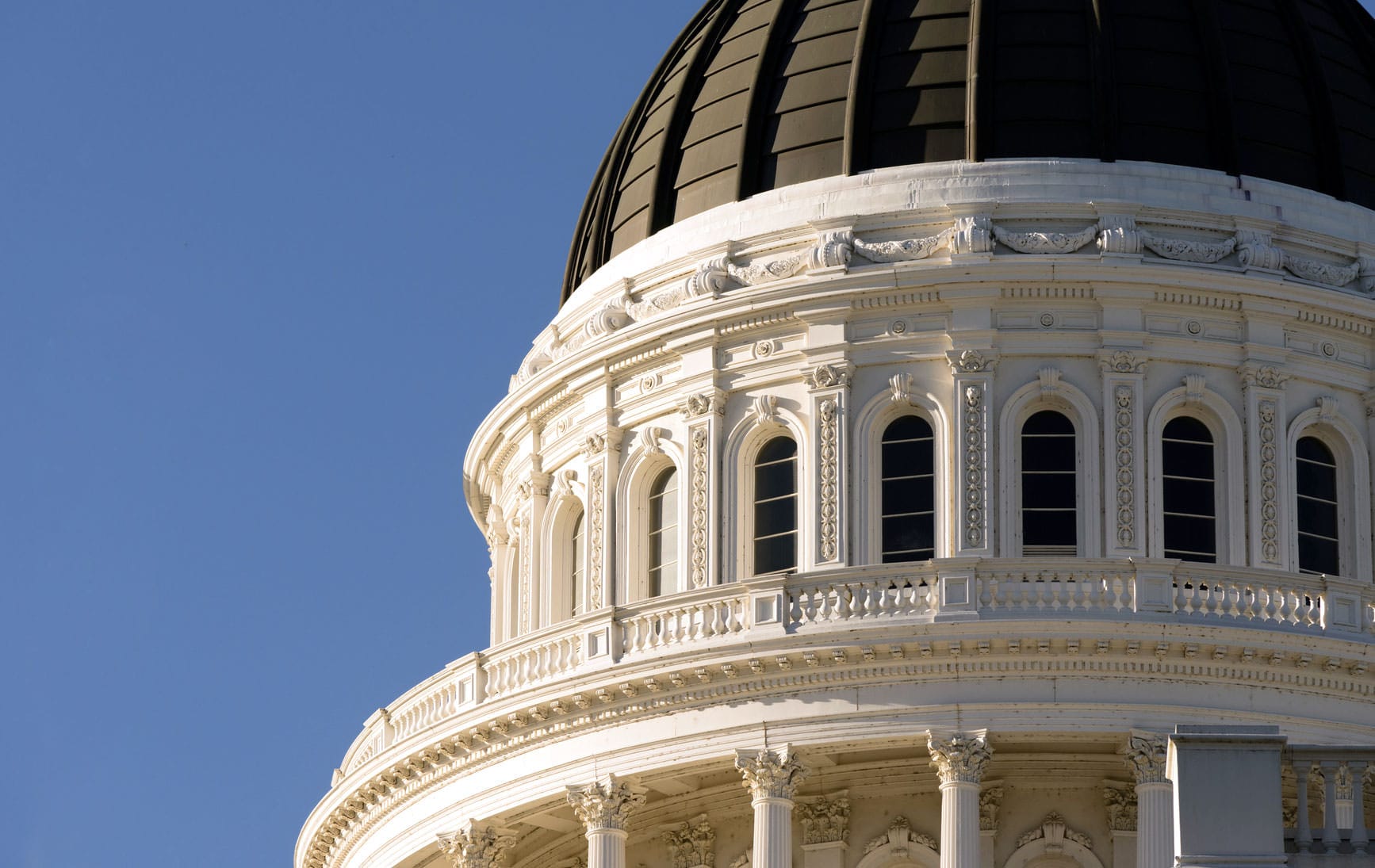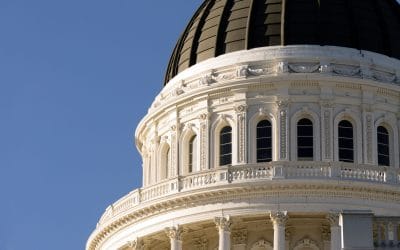Brown Act flexibilities for teleconference meetings extended through 2023
In the early days of the COVID-19 Pandemic, Governor Newsom signed Executive Order (EO) N-29-20, which, among other things, allowed public agencies to conduct meetings virtually without having to comply with certain provisions of the Brown Act, including that every teleconference location be accessible to the public. Originally only intended to last as long as social distancing was required by State or local public health agencies, the Governor signed another EO, N-08-21, in June 2021, extending these flexibilities through September 30, 2021. With that deadline only a few weeks away, Governor Newsom then signed AB 361, authored by Assembly Member Robert Rivas (D-Hollister), which, until January 1, 2024, exempts local legislative bodies from certain provisions related to teleconference public meetings under the Brown Act, including the Act’s teleconference quorum, meeting notice, and agenda requirements, during states of emergency.
Compared to the Governor’s previous executive orders on this subject, which simply waived the requirement for local agencies to comply with certain teleconference provisions of the Brown Act, AB 361 requires additional procedural steps before a legislative body can hold a meeting using the teleconference exemption. The exemption under AB 361 is also not limited to the COVID-19 Pandemic and may be used during any declared state of emergency, if either of the following conditions are met:
- State or local health officials have imposed or recommended measures to promote social distancing; or
- The legislative body has met and determined by majority vote that meeting in person would present imminent risk to the health or safety of
Once the body has met the requirements to use the exemption to meet virtually, AB 361 also requires the body to verify every 30 days by majority vote that the exemption from the Brown Act’s teleconferencing requirements is still necessary. Additionally, even if a legislative body decides to use the teleconference exemptions, it must still provide timely notice of the meeting and allow the public to access the meeting and directly address the body in real time.
An urgency bill, AB 361 took effect immediately when the Governor signed the bill on September 16. However, the swift implementation of the bill created some confusion in the field around which procedures a local legislative body was to follow, since the Governor’s June EO was still in effect until September 30. In response to this conflict, the Governor signed another EO, N-15-21, on September 20, which stated that the June EO governed virtual meetings through September 30, after which the provisions of AB 361 would go into effect on October 1.
New criteria for Williams inspections conducted after June 30, 2022
The culmination of three years of effort and two previously failed legislative attempts, AB 599 by Assembly Member Reginald Jones-Sawyer (D-Los Angeles) will update the criteria used by the State Superintendent of Public Instruction (SPI) to identify schools for inspection to determine compliance with standards contained in the Williams settlement regarding the sufficiency of instructional materials and school facilities. Current law requires the SPI to identify a list of schools using the Academic Performance Index (API) every three years, despite the fact that the API was last used to identify low-performing schools in 2013 and was repealed in 2018. As a result, the same schools have been subjected to Williams inspections year after year. Under AB 599, schools will now be identified if they meet either of the following criteria:
- All schools identified for comprehensive support and improvement (CSI) or additional targeted support and improvement (ATSI) under federal law; or
- All schools where 15% or more of the teachers hold permits or certificates that are lesser certifications than a preliminary or clear California teaching
AB 599 requires the SPI to use 2019-20 data to create an initial 2021-22 fiscal year list of schools to be inspected, which will be updated in 2022-23 and then every three fiscal years after that. However, the old API-based list will still be used for the 2021-22 school year, with the new list of schools to be used by County Superintendents beginning July 1, 2022.
Efforts for new school bond stall, will return next year
While there were efforts by the Legislature to place another statewide school facilities bond before California voters, both AB 75 ($12 billion for K-12 and Community Colleges) authored by Assembly Member Patrick O’Donnell (D-Long Beach) and SB 22 ($15 billion for public preschool, K-12, and all state community college and universities) authored by Senator Steve Glazer (D-Orinda) were held as two-year bills. Discussions on both bills will continue over the fall and it’s probable, given the continued interest, that the Legislature will place a statewide bond on the ballot in 2022. In the interim the 2021-22 budget deal included a one-time investment in the School Facilities Program of $250 million for new construction and modernization projects, however, this unexpected state investment is unlikely to continue.
Bill protects minor students’ right to disaffirm arbitration provisions in enrollment agreements as they relate to claims of criminal sexual assault or battery
Some districts require students or parents/guardians to sign enrollment agreements that include provisions for mandatory arbitration of all disputes and claims. AB 272 by Assembly Member Kevin Kiley (R-Rocklin) authorizes a minor student to disaffirm a provision in these enrollment agreements that aims to waive a legal remedy arising out of a criminal sexual assault or criminal sexual battery of the minor student. The bill provides that the student may disaffirm the provision regardless of whether a parent or legal guardian has already signed the enrollment agreement on behalf of the minor.
As the bill moved through the legislative process, questions were raised around the enforceability of the bill. The California Chamber of Commerce opposed the bill and, citing the U.S. Supreme Court’s decision in AT&T Mobility LLC v. Concepcion (2011), claimed the bill’s provisions are preempted by the Federal Arbitration Act (FAA). In Concepcion, the Supreme Court found that, “[The FAA] permits agreements to arbitrate to be invalidated by ‘generally applicable contract defenses, such as fraud, duress, or unconscionability,’ but not by defenses that apply only to arbitration or that derive their meaning from the fact that an agreement to arbitrate is at issue.” In an effort to counteract the preemption argument, AB 272 includes findings and declarations that state allowing a parent on behalf of their minor child to waive rights of the child as it relates to criminal sexual assault or battery is “unconscionable.” While it remains to be seen whether AB 272 will be challenged in court, barring any court intervention in the next few months, the provisions of the bill will apply to enrollment agreements beginning January 1, 2022.
The Governor signed the following general operations bills
Brown Act
- AB 361 (Rivas, Robert ) – Open meetings: state and local agencies: teleconferences.
This bill, until January 1, 2024, authorizes a local agency to use teleconferencing without complying with the teleconferencing requirements imposed by the Ralph M. Brown Act, if the legislative body of the local agency determines at a meeting during a declared state of emergency, when state or local health officials have imposed or recommended measures to promote social distancing, for the purpose of determining, by majority vote, that meeting in person would present imminent risks to the health or safety of attendees. AB 361 also provides similar exemptions for state agencies subject to the Bagley- Keene Act until January 31, 2022.
Chapter 165, Statutes of 2021 - AB 1291 (Frazier) – State bodies: open meetings.
Current law provides that a state body must provide members of the public an opportunity to directly address the state body on agenda items but authorizes the state body to limit the amount of time allotted for each member of the public to speak. This bill now also requires a state body, when it limits time for public comment, to provide at least twice the allotted time to a member of the public who utilizes translating technology to address the state body.
Chapter 63, Statutes of 2021 - SB 274 (Wieckowski) – Local government meetings: agenda and documents.
The Ralph M. Brown Act requires meetings of the legislative body of a local agency to be open and public and authorizes a person to request that a copy of an agenda, or a copy of all the documents constituting the agenda packet, of any meeting of a legislative body be mailed to that person. SB 274 requires a local agency with an internet website, or its designee, to email a copy of, or website link to, the agenda or a copy of all the documents constituting the agenda packet if the person requests that the items be delivered by email. If a local agency determines it to be technologically infeasible to send a copy of the documents or a link to a website that contains the documents by email or by other electronic means, the bill requires the legislative body to send, by mail, a copy of the agenda or a website link to the agenda and to mail a copy of all other documents constituting the agenda packet.
Chapter 763, Statutes of 2021
Child Abuse
- AB 477 (Rubio, Blanca) – Child abuse multidisciplinary personnel team: children’s advocacy centers.
Current law authorizes a county to establish a child abuse multidisciplinary personnel team, consisting of specified individuals, within that county to allow provider agencies to share confidential information in order for provider agencies to investigate reports of suspected child abuse or neglect. Current law also authorizes a county to use a child advocacy center to implement that multidisciplinary response. This bill clarifies that, if a county uses a child advocacy center, the team may include the child advocacy center. For an Indian child, the bill also adds a representative from the child’s tribe to the list of individuals that may be included on the multidisciplinary personnel team.
Chapter 93, Statutes of 2021 - ACR 66 (Cooley) – Child Abuse Prevention Month.
This measure acknowledged April 2021 as Child Abuse Prevention Month and encouraged Californians to work together to support youth-serving child abuse prevention activities in their communities and schools.
Chapter 40, Statutes of 2021 - SB 24 (Caballero) – Domestic violence: protective orders: information pertaining to a child.
Commencing January 1, 2023, this bill will authorize a court to include in an ex parte order a provision restraining a party from accessing records and information pertaining to the health care, education, daycare, recreational activities, or employment of a minor child of the parties. The bill also requires an essential care provider to develop protocols relating to compliance with that order on or before February 1, 2023.
Chapter 129, Statutes of 2021
Facilities
- AB 33 (Ting) – Energy Conservation Assistance Act of 1979: energy storage systems and electric vehicle charging infrastructure: Native American tribes.
The Energy Conservation Assistance Act of 1979 authorizes, among others, schools, to submit an application to the Energy Commission for an allocation for the purpose of financing all or a portion of the costs incurred in implementing a project. Current law creates the State Energy Conservation Assistance Account (ECAA), which is continuously appropriated to the Energy Commission for purposes of the Act. AB 33 requires the Energy Commission, in administering the account, to provide grants and loans to local governments and public institutions to maximize energy use savings, expand installation of energy storage systems, and expand the availability of electric vehicle charging infrastructure. The bill also expands the eligible entities who can participate in the ECAA program to include California Native American tribes, and establishes a sub account to track awards and repayment of loans to tribes.
Chapter 226, Statutes of 2021 - AB 1390 (Boerner Horvath) – State lands: school and lieu lands.
Current law grants to the State Lands Commission control over specified public lands in the state, including indemnity lands selected in lieu of specified land granted to the state by the United States for the use of public schools that was lost. Current law requires the commission to prepare a master plan for all school and lieu lands under its jurisdiction and requires the commission to obtain a statement from the United States Land Office after the survey of any township by the United States, as specified. AB 1390 repeals the above requirements.
Chapter 715, Statutes of 2021
Governance and Operations
- AB 272 (Kiley) – Enrollment agreements.
This bill authorizes a minor to disaffirm a provision in an educational institution’s enrollment agreement that purports to waive a legal right, remedy, forum, proceeding, or procedure arising out of a criminal sexual assault or criminal sexual battery on the minor, regardless of whether a parent or legal guardian has signed the enrollment agreement on the minor’s behalf. The bill would apply only to enrollment agreements for public or private schools maintaining a kindergarten or any of grades 1 through 12.
Chapter 146, Statutes of 2021 - AB 599 (Jones-Sawyer) – Public schools: accountability: county superintendents of schools.
AB 599 updates the criteria used to identify schools for inspection by a county superintendent of schools for purposes of the Williams settlement. Current law required schools to be identified for inspection if they ranked in deciles 1-3 of the Academic Performant Index (API), despite the API having been repealed in 2018. This bill replaces the API-based system and schools will now be identified for inspection, beginning with the 2022-23 school year, if they meet either of the following criteria:- All schools identified for comprehensive support and improvement (CSI) or additional targeted support and improvement (ATSI) under federal
- All schools where 15% or more of the teachers hold permits or certificates that are lesser certifications than a preliminary or clear California teaching
Chapter 667, Statutes of 2021
- AB 824 (Bennett) – Local educational agencies: county boards of education: governing boards of school districts: governing bodies of charter schools: pupil members.
AB 824 authorizes county boards of education and charter schools to also appoint one or more high school pupils as members of their governing bodies in response to petitions from high school pupils enrolled in their county or in their charter school, as appropriate. The bill also requires policies and procedures for the selection of pupils to serve on a county board of education to ensure and protect the privacy of each pupil, and of the parents or guardians of each pupil, involved in proceedings before the county board of education acting in its capacity as an appellate body.
Chapter 669, Statutes of 2021 - AB 945 (Ramos) – Pupils: adornments at school graduation ceremonies: task force.
This bill establishes a 10-member task force, convened by the California Department of Education (CDE), to gather certain information and develop recommendations for best practices, protocols, proposed legislation, and other policies that will address how to comprehensively implement all aspects of existing law related to wearing traditional tribal regalia or recognized objects of religious or cultural significance as an adornment at school graduation ceremonies. The bill requires the task force, on or before April 1, 2023, to submit a report to the Legislature on that information and those recommendations.
Chapter 285, Statutes of 2021 - ACR 53 (Ward) – Purple Star School Program.
This measure requests the CDE establish and manage a program designating schools that support military-connected pupils as Purple Star Schools and use the Military Child Education Coalition for resources and information regarding the Purple Star School Program.
Chapter 57, Statutes of 2021 - SB 254 (Borgeas) – Public schools: September 11th Remembrance Day.
SB 254 bill designates and sets apart September 11 each year as September 11th Remembrance Day, a day having special significance. The bill encourages, when September 11th Remembrance Day falls on a schoolday, each public elementary and secondary school to observe a moment of silence at an appropriate time while school is in session.
Chapter 102, Statutes fo 2021 - SB 442 (Newman) – School districts and community college districts: governing board elections: charter cities.
Current law authorizes, in any school district or community college district, a county committee on school district organization to establish trustee areas, rearrange the boundaries of trustee areas, abolish trustee areas, and increase to 7 or decrease to 5 the number of members of a governing board, or to adopt an alternative method of electing governing board members, except in a school district governed by a board of education provided for in the charter of a city or city and county. SB 442 deletes the exception for a school district governed by a board of education provided for in the charter of a city or city and county, for purposes of that provision.
Chapter 139, Statutes of 2021 - SB 594 (Glazer) – Elections: redistricting.
The California Constitution establishes the Citizens Redistricting Commission for the purpose of drawing district lines for the election of Members of the State Senate, Assembly, Congress, and the State Board of Equalization, and requires the commission to do so by August 15 in each year ending in the number one thereafter. For redistricting occurring in 2021, the Supreme Court of California, by peremptory writ of mandate in Legislature of State of California v. Padilla (2020) 9 Cal.5th 867, extended that deadline to December 15, 2021, or to a later date if specified conditions are met, due to a delay in the release of federal census data caused by the COVID-19 pandemic. This bill would, for the June 7, 2022, statewide direct primary election, make various changes, as specified, to existing law relating to candidate nominations and compilation of registered voter data in order to accommodate the extended state redistricting deadline.
Chapter 320, Statutes of 2021
PRA/Government Code 1090
- AB 473 (Chau) – California Public Records Act.
AB 473 recodifes and reorganizes the provisions of the California Public Records Act. The bill also includes provisions to govern the effect of recodification and states that the bill is intended to be entirely nonsubstantive in effect. The bill becomes operative on January 1, 2023.
Chapter 614, Statutes of 2021 - AB 474 (Chau) – California Public Records Act: conforming revisions.
This bill enacts various conforming and technical changes related to AB 473 (see above), which recodifies and reorganizes the California Public Records Act. The bill also specifies that any other bill enacted by the Legislature during the 2021 calendar year that takes effect on or before January 1, 2022, and that affects a provision of this bill shall prevail over this act, except as specified.
Chapter 615, Statutes of 2021
School Safety
- ACR 39 (Holden) – Roxie’s Wish: Drowning Prevention Week for Children.
This measure establishes every 3rd week of May as “Roxie’s Wish: Drowning Prevention Week for Children” in order to encourage counties, cities, and school districts to support national goals relating to drowning prevention.
Chapter 25, Statutes of 2021 - SCR 9 (Rubio) – Teen Dating Violence Awareness and Prevention Month.
This measure designated the month of February 2021 as Teen Dating Violence Awareness and Prevention Month.
Chapter 4, Statutes of 2021




0 Comments